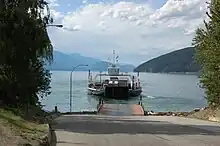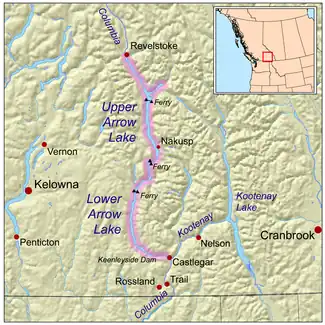Upper Arrow Lake Ferry
The Upper Arrow Lake Ferry is a ferry across Upper Arrow Lake in the West Kootenay region of southeastern British Columbia. Linking Shelter Bay and Galena Bay, the ferry, part of BC Highway 23, is by road about 52 kilometres (32 mi) south of Revelstoke and 47 kilometres (29 mi) north of Nakusp.
 Upper Arrow Lake Ferry from Galena Bay. | |
| Locale | Balfour−Galena Bay |
|---|---|
| Waterway | Upper Arrow Lake |
| Transit type | Passenger and automobile ferry |
| Carries | |
| Operator | WaterBridge Ferries Inc. |
| System length | 5 km (3 mi) |
| No. of lines | 1 |
| No. of vessels | 1 |
| No. of terminals | 2 |
| Website | www2 |
Arrowhead–Beaton
In 1896, the Canadian Pacific Railway's (CP) Revelstoke–Arrowhead branch line opened along the east side of the Columbia River.[1] At that time, the Arrowhead–Thomson's Landing (former name of Beaton), head of the lake, east–west ferry service commenced.[2] CP gradually withdrew its sternwheelers from the lake. By 1942, only the Minto remained. In 1954, CP abandoned the lake.[3]
Beaton–Galena Bay–Arrowhead
In 1916, James C. Fitzsimmons began this upper lake service, subsidized by the province. Initially chartering the CP tug Columbia, he soon bought the 23-metre (75 ft) Yale. In 1928, the Beaton Boat Co. became the operator, using its new steam tug Beaton to push a barge. In 1944, the Beaton Navigation Co. acquired the business.[4] In 1953, the Arrow Lake Transportation Co. became the operator. The next year, the subsidy ended, and the Interior Tug and Transport Co. won the contract for a Beaton–Arrowhead–Nakusp–Castlegar service. The 13-vehicle capacity diesel ferry Arrow Park made three trips weekly. In 1956, the British Columbia Ministry of Transportation took over the route and bought the vessel, renaming it the Lardeau.[5]
Arrowhead–Galena Bay
In 1957, the most easterly terminal relocated from Beaton to Galena Bay.[6][7] In 1968, the Arrowhead branch line closed,[8] the western ferry terminal relocated to Shelter Bay (after the reservoir for the Keenleyside Dam flooded the former Arrowhead),[9] and ferry fares were eliminated on the Upper Arrow Lake.[10]
Shelter Bay–Galena Bay

Announced in 1965, and implemented within a few years, were the construction of a new Revelstoke–Shelter Bay road along the west side of the Columbia, the introduction of a Shelter Bay–Galena Bay ferry, and a major upgrade to the Nakusp–Galena Bay road.[11]
Timeline
1969: DEV Galena with a 35-vehicle, 200-passenger capacity[12][13] (built 1968),[14] replaced the 12 Mile and 24 Mile ferries.[15]
1990: DEV Galena modified to a 50-vehicle, 150-passenger capacity vessel.[13] MV Needles relocated from Needles Ferry route and renamed MV Shelter Bay[12] (built 1969).[16]
2002: The service, which operated 5am to 1am, was reduced to 6am to midnight.[17]
2004: Western Pacific Marine became the service contractor.[18]
2007: By this time, service was 6:30am to 11:30pm.[19]
2008: Service was restored as 5am to 1am.[17]
c.2013: WaterBridge Ferries became the service provider.
2014: Designed and built by WaterBridge Steel at Nakusp, the 80-vehicle, 250-passenger capacity
MV Columbia was introduced to replace the two smaller vessels. Wider lanes and improved ramp transitions allowed faster loading and unloading.[20]
2020: A vehicle drove off the Shelter Bay terminal ahead of the incoming ferry. The driver, who was rescued, did not suffer any major injuries. An underwater dive team attached a tow truck cable to the submerged vehicle, which was lifted from the water.[21]
Operation
The ferry operates under contract to the British Columbia Ministry of Transportation and Infrastructure and is free of tolls, as are all inland ferries in British Columbia.[22] The MV Columbia sails every thirty minutes, from the first departure from Shelter Bay at 5am until the last at midnight, with a crossing time of about twenty minutes (the first and last departures are 5:30am and 12:30am from Galena Bay). The ferry has capacity for 80 vehicles and 250 passengers.[23]
See also
- Adams Lake Cable Ferry
- Albion Ferry
- Arrow Park Ferry
- Barnston Island Ferry
- Big Bar Ferry
- Francois Lake Ferry
- Glade Cable Ferry
- Harrop Ferry
- Kootenay Lake Ferry
- Lytton Ferry
- Little Fort Ferry
- McLure Ferry
- Needles Ferry
- Usk Ferry
Footnotes
- Meyer 1967, p. 18.
- "Weekly Herald, 27 May 1897". www.newspapers.com. p. 14.
From Arrowhead, there is a daily steamboat service to Thomson's Landing at the head of the north east arm of the lake, a distance of 10 miles from Arrowhead, the fare being $1.
- Clapp 1991, p. 37.
- Clapp 1991, pp. 37–38.
- Clapp 1991, p. 39.
- "Province, 13 Apr 1957". www.newspapers.com. p. 6.
….build a road from Galena Bay to Armstrong Lake near Beaton as a prelude to eliminating ferry service between Arrowhead and Beaton.
- "Province, 29 Nov 1957". www.newspapers.com. p. 4.
Meanwhile, the ferry will make two round trips daily between Galena Bay and Arrowhead….
- Meyer 1967, p. 28.
- Clapp 1991, pp. 39–40.
- Clapp 1991, p. 61.
- "The Daily Colonist, 21 May 1965". www.archive.org. p. 9.
- Carving the Western Path , p. 159, at Google Books
- Clapp 1991, p. 76.
- "Galena". www.vesselfinder.com.
- Clapp 1991, p. 40.
- "Shelter Bay". www.vesselfinder.com.
- "Valley Voice, 17 Jul 2008" (PDF). www.valleyvoice.ca. p. 1.
- "RFP 12-06-2010" (PDF). www.bcferries.com. p. 6 (4).
- "Galena Bay Ferry Landing". www.waymarking.com. 15 Jul 2007.
- "Kootenay Business, 9 Jul 2014". www.kootenaybiz.com.
- "Salmon Arm Observer, 13 Oct 2020". www.saobserver.net.
- "Inland Ferries". www.gov.bc.ca.
- "Upper Arrow Lake Ferry". www2.gov.bc.ca.
References
- Meyer, Ronald Howard (1967). "The Evolution of Railways in the Kootenays". www.open.library.ubc.ca.
- Clapp, Frank A. (1991). Ministry of Transportation and Highways, Lake and River Ferries. Ministry of Transportation and Highways. ISBN 0-7726-1364-8.